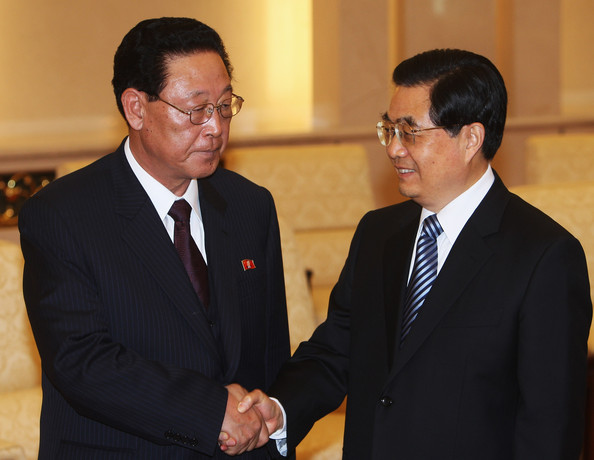 (6 February 2013, NKnews.ORG) With North Korea threatening to go beyond a third nuclear test in response to what it sees as “hostile” sanctions imposed after the December rocket launch, Chinese pressure to halt a North Korean nuclear test appears to be mounting at considerable pace.
(6 February 2013, NKnews.ORG) With North Korea threatening to go beyond a third nuclear test in response to what it sees as “hostile” sanctions imposed after the December rocket launch, Chinese pressure to halt a North Korean nuclear test appears to be mounting at considerable pace.
Building on high level talks held yesterday between Washington and Beijing, Chinese Foreign Ministry spokeswoman Hua Chunying told reporters today that Beijing is “extremely concerned by the way things are going…We oppose any behavior which may exacerbate the situation and [urge] relevant sides to exercise restraint and earnestly work hard to maintain peace.”
Chunying’s comments came following an agreement yesterday that the U.S. and China would “work together” to deal with the pending nuclear test, made public after U.S. Secretary of State John Kerry and China’s Foreign Minister talked by phone for the first time since Kerry took office.
On the subject of the call, State Department spokesperson Victoria Nuland said that both China and the U.S. agreed that North Korea should face “further consequences” if it violates UN Security Council resolutions with another test. Nuland also emphasized that the conversation between the two were “remarkably similar” to ones Kerry had in previous days with his Japanese and South Korean counterparts.
Beyond publicized Sino-American rhetoric, a senior Seoul diplomat told Yonhap News that he was aware that China was making its “own efforts” to persuade North Korea to cancel the test, although he did not elaborate on what those efforts were. The diplomat also said that China was taking the nuclear test “seriously.”
Outside of the diplomatic realm, an editorial in the English language Global Times today detailed Chinese displeasure even further, warning that Pyongyang would pay a “heavy price” for a third nuclear test and that China should “shatter any illusions Pyongyang may have” about not being punished.
While the editorial did note that Beijing would unlikely support the type of heavy sanctions that the U.S. and South Korea will likely demand in the event of a test, it underscored that China should support “reduced assistance” to North Korea and said that, “if Pyongyang gets tough with China, China should strike back hard.”
But despite all of the increasing rhetoric, North Korea expert Leonid Petrov today NK NEWS that in reality China is probably not that concerned about a further nuclear test.
Beijing policymakers know better than anyone how to benefit from Pyongyang’s insecurity and increasing international isolation. More sanctions against the DPRK means better deals for Chinese entrepreneurs operating in North Korea and increased dependency of Kim Jong-Un’s regime on China’s security assurance. A nuclear armed and unmanageable Pyongyang poses no threat to China but keeps its regional competitors anxiously overspending on their own national defense and security.
However, Chinese experts quoted yesterday in the Hong Kong daily Ming Pao have different thoughts. Shen Dingli, Executive Deputy Dean of the Institute of International Affairs at Fudan University, said that the planned nuclear test and rocket launch had already harmed China’s core interests, and that Pyongyang should be prepared to “bear the consequences” and “prepare itself for tougher international sanctions.”
In the same report Fan Jishe, a researcher on U.S. studies at the Chinese Academy of Social Sciences, went further and criticized Pyongyang for “embarrassing China” and “impeding [the progress of] Sino-U.S. relations.” He also criticized North Korea for implicitly blaming China for its “blind obedience” to Washington in the recent United Nations condemnation of the December rocket launch.
Amid the increasing pressure, Yonhap News suggests that the North Korean media’s decision to avoid citing Chinese media or report on Chinese news in recent weeks shows a growing spat between two countries once regarded as being as close as “lips and teeth”. A screening of KCNA, Rodong Sinmun, KCTV, Radio Pyongyang and Chosun Central TV showed that following the passage of the Chinese supported UN Security Council Resolution on Jan. 23, there had been almost no mention of China in the North Korean media.
Tensions between China and North Korea have been on the increase recently, with public disagreements bubbling over in areas even outside of the nuclear realm. Less than two weeks ago Pyongyang reportedly hit out at Beijing for allowing reports to circulate that Kim Jong Un may have had plastic surgery to look like his grandfather Kim Il Sung.
Some suggest that China is the most important party in efforts both to dissuade North Korea from conducting a nuclear test, though others suggest Beijing’s influence is much more limited than leaders in the U.S. and South Korea like to think.
China has been traditionally uncooperative in pushing North Korea too hard, officially due to worries over fanning political and further economic instability in its neighbor.
To date, Pyongyang has conducted two nuclear tests, the first in 2006 and the second in 2009. Both times China ensured that sanctions on North Korea avoided inflicting too much economic damage.
—


 BEIJING: North Korea’s rocket launch showed China did not have as much influence on Kim Jong-il’s regime as some believed, despite being its main economic and political ally, analysts said. Leading up to the launch, China came under widespread pressure to use its influence on its communist neighbour not to go ahead.
BEIJING: North Korea’s rocket launch showed China did not have as much influence on Kim Jong-il’s regime as some believed, despite being its main economic and political ally, analysts said. Leading up to the launch, China came under widespread pressure to use its influence on its communist neighbour not to go ahead.
You must be logged in to post a comment.